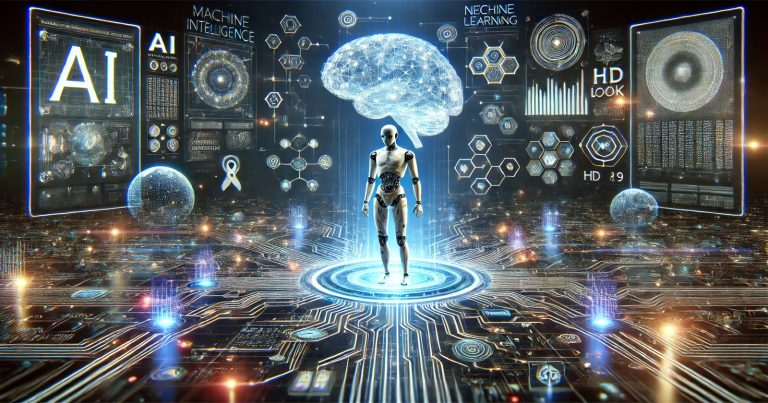Artificial intelligence and machine learning allow computers to simulate human thought and learning. They troubleshoot, they make choices, and they learn independently of humans. AI & ML are altering the way we live, work & use technology daily. Both of these spheres are incredibly powerful. AI is a field that makes machines intelligent. We find them in phones, hospitals, schools, cars, and much more. Now, let us see how they function and what sets them apart.
Artificial Intelligence and Machine Learning
Machine learning is a subset of artificial intelligence. 0.6 It enables computers to learn from data and make intelligent decisions. Machine Learning algorithms are rules and procedures that help computers learn how to identify patterns. This type of artificial intelligence trains a computer using data, much like a child learns by example.
What are Machine Learning Algorithms?
Machine learning algorithms are like recipes. They all train a machine on how to learn a task. These are math- and logic-based algorithms. They look at past data. After that, they look for patterns. Then they leap and make predictions on new data. If that guess is incorrect, the algorithm learns and tries again. Over time, it gets better.
Machine Learning Types
- Supervised Learning: The computer receives input-output pairs. Like a teacher revealing questions and their answers.
- Unsupervised Learning: We only give examples to the computer. It has to discover patterns on its own.
- Reinforcement Learning: The computer learns by doing and getting rewards or punishments
| Algorithm | Type | Use Case |
| Decision Trees | Supervised | Sorting things like emails |
| K-Means Clustering | Unsupervised | Grouping customers |
| Q-Learning | Reinforcement | Games, robots |
| Linear Regression | Supervised | Predicting house prices |
| Random Forest | Supervised | Diagnosing diseases |
Why Are Algorithms Important?
Algorithms are the brains of machine learning algorithms. Machines cannot learn without them. They make search engines, shopping websites, and maps smart. Machine learning algorithms are responsible for the video suggestions you get every second of every day, for every ad you see online.
Several tech companies and start-ups in India prepare students to create improved machine learning models. These skills will help Indian students to develop the app and smart tools for big industries.
What is Difference Between Deep Learning and Machine Learning?
Just like Deep Learning is confused with Machine Learning post. They are not. Deep learning is a sub-field of the field of machine learning. It is built on layers of artificial brains known as neural networks. It performs well in a data-dense environment. This subject provides you with a simplistic understanding of deep learning vs machine learning.
Machine Learning Basics
Machine learning can be applied to small to medium data. It uses simple rules. It requires previous data and uses the experience to solve future problems. However machine learning algorithms are similar in that they hit a plateau. They require a human to help them improve.
Deep Learning Basics
With Big Data comes Deep Learning. It mimics how our brain functions. It processes data using a large number of layers. Deep learning is not heavily reliant on human input. It keeps learning by itself. It’s very good in the case of speech, videos and photos.
A simple table for deep learning vs machine learning is shown here:
| Feature | Machine Learning | Deep Learning |
| Data size | Works on less data | Needs a lot of data |
| Hardware needs | Normal computers | Strong GPUs or TPUs |
| Time to train | Faster | Slower |
| Accuracy | Good | Very high |
| Example use | Spam filters | Face recognition |
Which One Should You Learn?
Machine learning should be the starting point for Indian students. It is easier and faster. Afterward, they may progress to deep learning. Both skills come in handy in India’s IT jobs, banking, and startups. Deep learning will be increasingly critical as companies scale. Both are useful; teaching both;helpss students get better jobs.
Comparison of AI & Machine Learning
Artificial intelligence and machine learning Many students believe these two terms are interchangeable. But they are not. Let’s discuss the differences between AI and machine learning in detail in this part. AI is a vast field with numerous branches. That’s a portion of it — machine learning.
What Is Artificial Intelligence?
Artificial intelligence is what makes machines intelligent. AI solves problems, gives a speech, plays the game, etc. It copies how humans think. AI covers a lot of ground, including learning, planning, natural language processing, and vision.
What is Machine Learning?
Machine learning is a tool within AI. It enables machines to learn from data. Machine learning makes AI smart. Machine learning, with a subset of AI and computer science, is a computer’s ability to learn from data. It allows machines to make decisions independently without an individual directing them through each step in the process. Artificial intelligence and machine learning combine to help machines think and learn like us. So, machine learning is the answer to what machine learning is in the sense that it is a practice by which systems can extract patterns from data, make decisions based on this data, and adapt and improve autonomously.
| Feature | Artificial Intelligence | Machine Learning |
| Goal | Make smart systems | Help systems learn |
| Scope | Wide | Narrow |
| Tasks | Thinking, planning, etc. | Learning from data |
| Human Help | Less | Needs training data |
| Example | Siri, self-driving cars | Product suggestions |
Why This Comparison Matters?
And understanding the difference helps students make decisions about what to learn first. In India, tech jobs today require both skill sets. Students must learn AI vs machine learning, as it enables them to pursue careers in robotics, automation, and fintech, among others.
Best Uses of Machine Learning in the Modern World
Machine learning does help at lot many places. Machine learning changes for more than health. Machine learning applications, in India and across the globe, are expanding rapidly. This is how machine learning takes us to the next step in reality. Here are places where machine learning succeeds:
- Medicine: It watches X-rays, detects sickness, and recommends medicine.
- Education: It assists teachers in identifying weak students and providing study advice.
- Banking: It catches fraud, and assists with smart loans.
- Retail: It recommends products and catalogs wthatpeople like.
- Transport: It assists with traffic, paper routes, and self-driving cars.
Real Use in India
Here’s how companies in India are using machine learning:
- It was during Aadhar verification Face recognition
- Monitoring: Farmers use apps to water or spray pesticides.
- EdTech: How EdTech Companies Help Students With Online Learning
Growing Job Roles
This creates careers in machine learning such as:
- Data Scientist
- AI Engineer
- ML Developer
- AI Product Manager
Machine learning jobs are lucrative for Indian students learning it. There is a greater need for trained people in start-ups and big tech firms.
Relevance to ACCA Syllabus
AI and machine learningares becoming a significant trend factor in various areas including audit automation, risk analysis, and fraud detection as well as in financial reporting. ACCA syllabus including papers like Strategic Business Leader (SBL) and Audit and Assurance (AA) discuss the benefits of these technologies in efficiency, better decision-making, and compliance. Knowing their purpose allows future accountants to undergo a digital transformation in finance.
Artificial Intelligence and Machine Learning ACCA Questions
Q1: What is the role of artificial intelligence in enhancing the audit process?
A) By removal of human judgment
B) Automating repetitive tasks and detecting anomalies
C) By eliminating the requirement for audit evidence
D) Through automated preparation of financial statements
Ans: B) Automating repetitive tasks and detecting anomalies
Q2: Which ACCA paper focuses on how technology such as AI and ML affect business decisions?
A) Financial Reporting (FR)
B) Audit and Assurance (AA)
C) Strategic Business Leader (SBL)
D) Taxation (TX)
Ans: C) Strategic Business Leader (SBL)
Q3: What is one big advantage of machine learning used in audits?
A) On financials automates all reporting
B) Assist in understanding investor behavior
C) Provides better detection of outlier patterns in transactions
D) Prepares tax computations
Ans: C) Increases the effectiveness of identifying abnormal patterns in finances
Q4: What role does AI play in internal controls supporting financial systems?
(a) Including all the manual reviews
B) In place of the aauditor’sopinion
C) By tracking transactions in real-time, identifying risks
D) Through the preparation of statutory audit reports
Ans: C) To flag risks in real-time transactions
Which of the following best explains the use of AI in fraud detection?
A) AI eliminates the need for ethics training
B) AI randomly audits transactions
C) AI analyzes a large amount of transaction data to detect fraud patterns
Q4) AI is going to take over the role of human auditors
Ans: C) AI examines a massive number of transactions to identify patterns of fraud.
Relevance to US CMA Syllabus
In the US CMA syllabus, Technology and Analytics topics underline AI and ML in performance management, decision support, data governance, and control systems. Understanding these technologies is paramount for today’s management accountants to allow optimal cost analysis, budgeting, forecasting, and strategic decision-making.
Artificial Intelligence and Machine Learning CMA Questions
Q1: What is the role of AI systems in performance management for CMA roles?
A) Through company policy writing
B) By manually tracking KPIs
C) Offering real-time analytics and trends for business-critical metrics
D) Eliminating the requirement of human contribution
Ans- C) To offer real-time analytics and trends for important metrics
Q2: How does machine learning contribute to cost management?
A) Manual invoice entry
B) It is a prediction of a cost behavior
C) Static reporting only
D) Filing tax returns
Ans: B) Cost behavior predictive analysis
Q3: AI tools can help with budgeting by:
A) Getting rid of planning meetings
B) Finding new forecasts using past data patterns
C) Ignoring historical trends
D) Avoiding real-time data
Ans: B) Utilize previous data trends to make better future predictions.
Q4: What is the role of machine learning in the risk management of the CMA?
A) Collects audit evidence
B) Uses data patterns to forecast and categorize financial risks
C) Automates tax filing
D) Organize financial statement
Ans: B) Uses data patterns to forecast and categorize financial risks
Q5: Why is one major advantage of using AI within dashboards in the context of CMA?
A) Shows outdated data
B) Simplifies audit processes
C) Provides live and predictive analytics
D) Prints monthly reports
Ans: C ) Provides live data and predictive analytics
Relevance to US CPA Syllabus
Though, artificial intelligence, machine learning, and its allied subjects are not formally included in the syllabus for a US CPA but are implicitly covered as part of the Audit and Attestation (AUD), Business Environment and Concepts (BEC) and Regulation (REG) sections. They impact all aspects of data-driven audits, internal control systems, tax compliance and business processes, making them a fundamental part of the changing landscape of CPAs operating in a digital economy.
Artificial Intelligence and Machine Learning CPA Questions
Q1: In general terms, how does AI help automate the audit process?
A) It makes sampling unnecessary
B) It provides audit opinions
C) Reviews full data sets for anomalies
D) It wipes all doc
Ans: C) It monitors complete data sets for anomalies
Q2: What CPA exam section covers the business use of AI and ML?
A) REG
B) FAR
C) BEC
D) AUD
Ans: C) BEC
Q3: What is the role of machine learning in tax planning?
A) Preparation of tax returns manually
B) Asprediction and scenario simulation for tax risk
C) Replacing tax codes
But this would mean: D) The abolition of auditing.
Ans: B) Scenario planning and tax-risk prediction
Q4: What does AI allow CPAs to do in audit analytics?
A) Prepare journal entries
B) Run walkthroughs by hand
C) Root out errors and fraud with data-driven insights
D) Avoid internal controls
Ans : C) Identify new errors and fraud from data-driven insights
Q5: What is the significance of machine learning in CPA firms?
A) No more need to communicate with the client
B) It generates legal agreements
C)It automates routine compliance checks
D) It substitutes CPAs across the board
Ans: C)It automates routine compliance checks
Relevance to CFA Syllabus
Artificial Intelligence and Machine Learning are covered in the CFA curriculum under FinTech (Financial Technology), Quantitative methods, and Portfolio Management. We help financial analysts leverage big data, optimize portfolios, and predict trends. Learning about AI and ML is a must-have for successful smart investment in 2023 tech-driven markets.
Artificial Intelligence and Machine Learning CFA Questions
Q1: In what ways is machine learning useful for portfolio management?
A) Creates regulatory rules
B) Uses historical data patterns to predict market trend
C) Files client taxes
D) Avoids diversification
Ans: B) Predicts market trends using historical data patterns
Q2: How relevant is AI to CFA and investment analysis?
A) Developing accounting standards
B) Identify a fake bank transaction
C) Detects hidden patterns in vast amounts of financial data
D) Draft investment contracts
Ans: C) Discovers hidden trends in large financial datasets
Q3: How does the AI-driven rrobotadviser provide an advantage?
A) Charge high fees
B) To provide tailored investment recommendations based on Ongoing analysis
C) Only work for banks
D) Require no data
Ans: B) Provide personalized investment recommendations based on current data
Q4: At which CFA level are technologies such as AI, blockchain, etc., covered in detail?
A) Level I
B) Level II
C) Level III
D) All Levels
Ans: D) All Levels
Q5: What is the benefit of machine learning for CFA candidates?
A) To memorize tax laws
B) For manual trading only
C) Predictive Analytics for Better Investment Decision
D) To prepare audit reports
Ans: C) Utilization of predictive analytics to improve investment decisions


